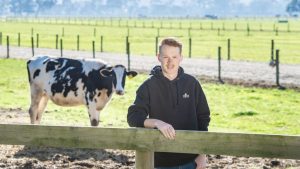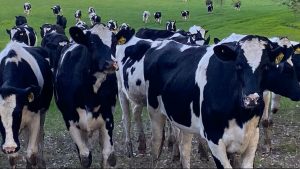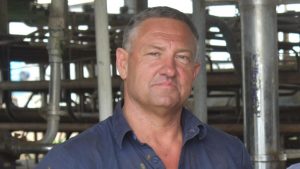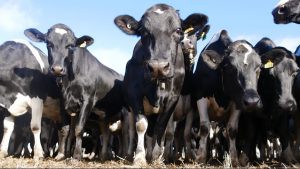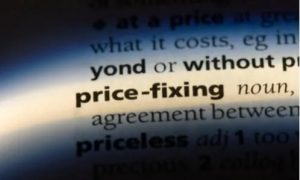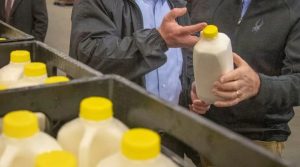
The 2023 calendar was launched in Lakes Entrance in mid-December, at Gippsland Jersey’s milk processing facility, and involves the families behind 12 dairy farms across the region.
The calendar is a passion project of the founders of Gippsland Jersey, Steve Ronalds and Sallie Jones, who bring their philosophy of wellbeing and wellness into their business.
It is the fifth annual calendar the business has produced in the past six years and there is now an online community of dairy farmers supporting each other.
This support has extended to groups of dairy farmers camping on each others’ properties and helping clean up burned fences and re-fence farms after the 2019-20 bushfires in East Gippsland.
“People need people, and doing this calendar every year helps us all recognise the impact we have when we do something that helps other people,” Steve said.
The public launch of the 2023 calendar was attended by dairy farmers from across Gippsland. Six dairy farmers spoke about the stresses of farming and how they coped with them.
Ross Anderson, from Dennison, said it was easy to become “drowned in daily issues of calving, flooded paddocks, relationship breakdowns and family stresses”.
Having experienced the gamut of these stresses, “adversity is an opportunity for growth,” Ross said.
“Stop and do what you need to do to reset.”
He uses exercise, mindfulness, breathing and listens to podcasts to help him cope.
“There are a lot of resources out there,” Ross said.
“All the stuff that happens has already happened. I don’t need to keep going over it, but I do need to find ways to move ahead.”
When it comes to wellbeing, particularly mental wellbeing, Chris Kane, a dairy farmer at Marlo, said it was important to have conversations that broke open the stigma attached to talking about mental health.
“Ten years ago, people would’ve avoided having that conversation with me, but I think we’ve made progress [as a society] and today people will drop in to the farm and see how I’m going,” Chris said.
Making sure your family and friends were part of your support network was important, according to Matt Willis, whose dairy farm is at Yarram.
“Talk about what’s going on so people in your community know and are open to having a chat when you see them walking along the street in town,” Matt said.
He practices being grateful for the family and other people around him and his opportunity to farm every day.
“Make sure you have someone to reach out and talk to,” Matt said.
The Federal Government announced in December it would reduce psychological and counselling support funded by Medicare.
When the COVID-19 pandemic occurred, the Federal Government announced an additional 10 sessions annually — on top of the existing 10 sessions — would be funded by Medicare.
The decision recognised the impact of the 2019-20 bushfires and the pandemic, and has also been available for people affected by floods to access psychological and counselling support.
That additional 10 sessions have been cancelled, as of the beginning of 2023.
Co-founder of Gippsland Jersey, Sallie Jones, whose father committed suicide in 2016, was scathing of the decision.
“The system is fairly broken when you’re in need and can’t get help,” Sallie said.
“When people are in mental distress, it’s a challenging time for everyone involved.
“Mental health is a real problem. The statistics of suicide, and its ripple effect in our communities, are enormous.”
Federal Member for Macnamara Josh Burns has publicly called out his party for the decision to withdraw funding.
His maiden speech in 2019 addressed the need for mental health funding and support.
After the announcement in mid-December, the Labor MP contacted the health minister and assistant mental health minister.
“One of the most difficult problems that confronts our healthcare system, is ensuring access to affordable and adequate mental health treatment for those who need it,” Mr Burns said.
“I believe that while there are real challenges in managing access to services [including not enough healthcare professionals], the answer is not to reduce support for those people who need it.
“For those people who require more than 10 sessions of Medicare-funded mental healthcare, the extra sessions can be the difference between someone’s anxiety increasing or being effectively managed.
“It can be the difference between everyday functioning — participating with family, friends, at school or work — or not coping at all.
“And it can affect how often someone with mental health challenges can see their mental health professional.”
Mr Burns has committed to lobbying for reinstatement of the additional 10 Medicare-funded mental health care sessions.
If you feel your mental health is an emergency situation, always call 000. If you need crisis support, you can phone Lifeline on 131 114 or text Lifeline on 0477 131 114.






